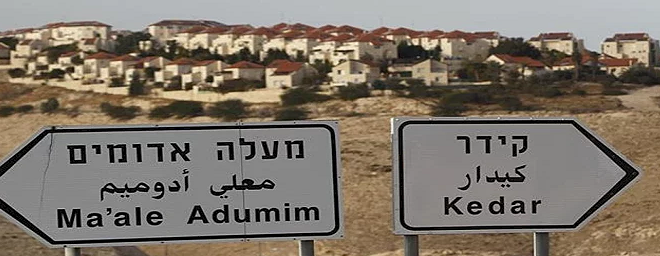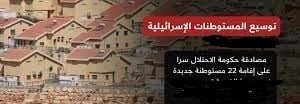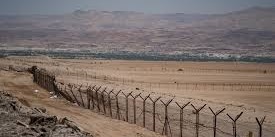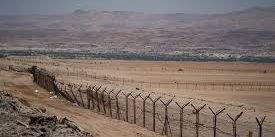By: Madeeha Al-A’raj
The national Bureau for Defending the Land and Resisting Settlements stated in its latest weekly report , that in his speech before a joint commission of the Spanish Parliament last week, the Spanish FM Jose Manuel Albarez said, his government has begun imposing sanctions on settlers, who commit violence against Palestinians in the occupied West Bank, adding, we have already sanctioned a first group of 12 settlers, noting that Spain is the fifth country to impose sanctions on settlers, who practice violence against Palestinians after America, Britain, Canada, and France.
According to a White House statement, the US President Biden issued last Feb. an executive order aimed at punishing four Jewish settlers, who attack Palestinians in the occupied West Bank, after this violence reached unbearable levels and became a serious threat to peace, security and stability in the West Bank, Gaza, and Israel as well as the Middle East. A few days later, the British government has decided to impose sanctions on four settlers without revealing their names, while the French government increased the number and announced that it has imposed sanctions on “28 extremist Israeli settlers” who committed “acts of violence against Palestinian civilians” in the West Bank, at the same time it asserted that “settlement is illegal under international law, and must stop, as its continuation is not compatible with the establishment of a viable Palestinian state, which is the only solution that enables Israelis and Palestinians to live side by side in peace and security.”
The sanctions ranged from financial to visa restrictions against individuals found to have “attacked or terrorized Palestinians or seized their property.” Each of these countries that participated in making these decisions had different motives. For the American Administration, as for Britain, the decision reflected a compromise between the brutality of the war, which the occupying state is waging on the Gaza Strip, with clear support from both countries, and a political maneuver to appease the Palestinians. This move, with its symbolism, is unprecedented in the US Administration’s policy, and it came in conjunction with Biden’s move to the electoral swing state of Michigan, which is also the focus of growing Arab-American anger against the Democratic Party because of its pro-Israel policies in the war on Gaza.
France and Spain are two central countries in the European Union, deviated from the line with unilateral decisions after they realized the difficulty of reaching a collective position adopted by the EU countries on this level. European Commission President Ursula von der Leyen, who blindly supports the policy of the Israeli occupying state, supported on more than one occasion imposing sanctions on “extremists” Israeli settlers in the occupied West Bank and denounced before the European Parliament the “escalation” of their acts of violence, which considered threatening the stability of the region, without making an effort to overcome what obstructs that at the European level, while European Union foreign policy coordinator Josep Borrell pledged more than once that he would continue his efforts to overcome obstacles and impose sanctions with a collective stance from the EU countries on “Jewish extremists,” who practice violence against the Palestinians in the West Bank.
Countries of the EU are not united in their position on imposing sanctions, even within the limits of carrying symbolic messages, some of them speak out, others remain silent, and others stand stubbornly against imposing sanctions on those settlers, who practice violence against the Palestinians, led by countries, such as, the State of Hungary and Czech Republic State.
Israeli responses to these steps, which generally carry symbolic messages, came soon. The Israeli PM Netanyahu’s office confirmed that “there is no need” for such measures, while his extremist allies in the government, Finance Minister Bezalel Smotrich and National Security Minister Itamar Ben, condemned the sanctions. The Minister of Settlement in the Ministry of the Army, head of the Religious Zionism Party, Bezalel Smotrich, described “the campaign of settler violence as an anti-Semitic lie spread by Israel’s enemies with the aim of distorting and harming the first settlers and the settlement establishment, and thus discrediting the entire State of Israel,” adding, “We are not a banana republic of the United States, and we will not allow our citizens to be harmed.” As for Ben Gvir, he described the freezing of settlers’ bank accounts as a “red line,” adding in his posts on social media, “We greatly respect and appreciate our allies in the world, but we must not allow anyone to run the State of Israel, and we are not Star on the American flag.”
Nonetheless, did these decisions with their symbolic meanings have impact on the policy of the occupying state? Developments on the ground give a clear answer, as Israeli reactions realize the weakness of the message sent by these countries with their decisions, which affected some distant parties and moved away from the center and the core. In addition, the settlers, who were included in the sanctions, were classified as individuals who practice violence against the Palestinians at a time when the concerned countries know that they belong to organized terrorist groups operating in the settlements, settlement outposts, and so-called pastoral farms.
They have their spiritual authorities i.e. well-known rabbis in the settlements, their political authorities i.e. well-known ministers and members of the Knesset, and their field authorities i.e. settlement heads and introspection councils. They also have their local associations, which provide them with funds in addition to the funds of the government and the relevant ministries, and their transcontinental associations, a number of which operate in the United States of America. All of them are outside the circle of targeting, including the arsonist Itamar Ben Gvir, whom some circles in the American Administration hinted at as being possibly within the circle, while the Minister of Settlement in the Ministry of the Army, Bezalel Smotrich, maintained a variety of immunity and protection, even in the statements of a number of officials in the American Administration.
The construction of 3,500 new housing units in the “Maale Adumim,” “Efrat,” and “Kedar” settlements council was approved, claiming that it comes in the wake of the shooting attack at Al-Za’im checkpoint east of occupied Jerusalem two weeks ago. This approval came a year after the head of the extremist Religious Zionism Party, Bezalel Smotrich, was appointed a minister in the Ministry of the Army, responsible for settlement. Following the approval of this new settlement building, Smotrich said, “We carried out major things for settlement this year, and this is a good start.”
In parallel with the approval of housing units, we will push towards settling youth settlement i.e. settlement outposts and so-called pastoral farms, surveying land and issuing decrees on them, security personnel and streets in Judea and Samaria on an unprecedented scale as security belt for the State of Israel – the Shield of Israel,” he thanked the Prime Minister, the Minister of the Army, the Minister of Strategic Affairs, and the employees of the Civil Administration and the Planning Office for their cooperation.
Smotrich did not forget to mention that the Israeli government, which was formed after the last elections for the Knesset at the end of the year 2022, had approved the legalization of the occupation of about 34 random settlement outposts, some of which were classified as settlements and the annexation of others as neighborhoods to existing settlements, and the construction of 18,515 housing units in the settlements, which is a very high number by all standards, and clearly indicates that this government does not give weight to the positions of countries and international organizations, as long as the positions are still taking place within the framework of statements of rejection and denunciation or within the framework of symbolic messages, as is the case with the sanctions that are imposed on a few settlers, who practice violence against Palestinians.
As for Musafer Yatta, the occupation issued new military orders preventing Palestinians from entering their lands near the settlements in Musafer, knowing that these lands are of high agricultural quality and part of them are planted with olive trees and others in separate areas in the villages of Saddat-Ta’la and Um al-Khair, which are adjacent to the “Karmiel” and “Ma’on” settlements, and the villages of Al-Tawanah, Mughair Al-Ubaid, Tuba, Sha’b Al-Batm, and Qawawis, which are close to the settlements of “Givat Maon,” “Avigal,” and “Mitzpe Yair.” The new orders come as an extension of a number of military orders, which are being implemented under the judicial cover of the Israeli courts, including the Israeli Supreme Court, which decided once and for all that military needs trump the law, it a clear indication of the rejection of the residents’ petitions and in clear submission to pressure from the “Regavim” organization.
The increasing settlement activity to force the authorities to implement demolition and deportation decisions, which places the residents of the Palestinian communities in the region facing a serious and real threat, which becomes more dangerous with the dramatic political changes formed by the recent Israeli government, with the participation of Ministers Itamar Ben Gvir and Bezalel Smotrich, which placed as top priorities the settlement project, its expansion and its implementation.
The policy of displacement and ethnic cleansing is taking place in the region as planned and is gaining clear momentum these days, especially in the circumstances of the brutal war on the Gaza Strip. Just as a reminder, the population of Al-Musafer a few years ago was about 3,000 people, but today the number does not exceed 1,200 Palestinians living in 12 villages on an area of 35,000 dunams surrounded by army camps and settlements, which are “Janba, Al-Markaz, Al-Halawa, Al-Fakhit, Al-Tabban, Al-Majaz, and Safa Al-Fawqa, Safa Al-Tahta, Mughair Al-Ubaid, Tuba, Khallet Al-Dabaa, and Al-Mufaqara.”
On the other hand, and in an interview with the Turkish Anadolu Agency, the Director of the Israeli Committee Against Home Demolitions, Jeff Halper considered that the successive Israeli governments adopt “a policy of house demolitions as a primary means of ethnic cleansing against Palestinians, adding that since October 7, the occupation has demolished 300,000 homes in Gaza, which constitutes 75% of the homes in the ethnic sector.” He said, “If you think about the hundreds of thousands of homes that have been destroyed since 1948, we see that, demolishing Palestinian homes is a main tool Israel uses to expel them from their lands and turn them into a Jewish state.”
Since the 1948Nakba, 60,000 Palestinian homes were destroyed in more than 530 areas, and since the 1967 Nakba until today, about 60,000 homes have been destroyed in the West Bank, East Jerusalem, and the Gaza Strip. Halper pointed out the United States and the United Kingdom plan to absorb 50,000 Palestinians, and France 30,000, in an attempt by Israel to once again turn the Palestinians into refugees and empty Gaza of its population.
List of Israeli Assaults over the Last Week Documented by the National Bureau:
Jerusalem:
- Forcing Jerusalemite doctor, Nidal Alyan to self-demolish his residential building, in the Alyan Neighborhood in Al-Issawiya, under the pretext of not having a license, and to avoid paying the demolition fees that is about NIS 450,000.
- Bulldozing land in the Sheikh Anbar Neighborhood in the Al-Zayyim town, and at the same time installed cameras in the town of Sur Baher, to monitor movement of citizens, and in Hizma, they continue to excavate and bulldoze lands belonging to the municipality for the benefit of a project to build settlement roads.
- Demolishing a retaining wall, and bulldozed land for the Burqan family in the Ein al-Loza Neighborhood in the Silwan town. They also installed surveillance cameras.
Hebron:
- Attacking citizens’ homes in Al-Fawwar Camp, south of Hebron, and opened fire on them, fired toxic tear gas towards them, and other “Kiryat Arba” settlers attacked citizens’ vehicles on the main street east of Hebron, smashed their windows.
- Chasing shepherds in Wadi Al-Tayaran in Al-Dhaheriya, south of Hebron, and farmers and shepherds in the village of ‘Amnizel’, east of Yatta, and prevented them from reaching their fields and pastures in several areas east of Yatta and Al-Musafer, south of Hebron.
- Attacking a group of children while they were collecting “aqob” plants in Wadi Al-Jawaya, destroyed agricultural crops belonging to Makhamreh and Hamamda families, in Maghayir Al-Obaid and Fateh Sidro, and prevented them from accessing them.
- Chasing shepherds and farmers in the village of Al-Halawa, and fired bullets directly at them, they also attacked shepherds in the village of Al-Mufaqara in Musafer Yatta, and destroyed citizens’ fences and trees at gunpoint.
Bethlehem:
- Seizing 2 agricultural rooms in the Kaisan Wilderness after dismantling them in the Thaghrat Badr area, in addition to sheets of tin belonging to Moh’d Yousef Abayat, attempted to assault him and threatened to kill him if he was again on his land.
- Bulldozing about 40 dunams, and uprooted 400 olive seedlings belonging to the heirs of Othman and Abdel Aziz Al-Haroub in the “Abu Siyaj” area.
- In Beit Jala, the occupation forces closed the Sidr Road near the Talita Qawmi School with dirt barriers, which leads to settlement road n. 60 and the tunnel checkpoint, to close them down on the city and the Bethlehem Governorate in general, while the occupation forces assaulted the citizen Issam Ahmed Abdel Hamid Al-Salibi, 49 from the Beit Ummar town, then detained in the Etzion camp while working in the Wadi Al-Rish area, and threatened to arrest him should he returned to working on his land
Ramallah:
- Notifying the seizure of 29 dunums in the Sinjil and Turmus Ayya towns by the end of 2026, under security pretexts, and to erect a fence that prevents citizens from the two villages reaching the main street.
- Attacking citizens in the Ain Samiya area in the village of Kafr Malek, and farmers in the “Al-Dabat” plain while they were working on their lands in the town of Turmus Ayya and uprooted a number of olive trees, and attacked farmers while they were plowing their land, and forced them to leave.
- Burning the house of citizen Najeh Mahmoud Samreen with Molotov cocktails, before citizens intervened to extinguish the fire in the village of Barqa, and a car shed belonging to the citizen Muhammad Saber Maatan, and destroyed a “tent” for sheep belonging to the citizen Ammar Saleh Asalia.
- Demolishing an agricultural room and three tents for livestock, owned by the citizen Sa’dat Shalash in the Abu Saba area in the village of Shuqba.
Nablus:
- Setting up a settlement outpost consisting of 6 “caravans” on the lands of the eastern Al-Laban village in the “Ras Al-Marajat” area, south of the village, attacked the village and fired live bullets at the citizens, their homes, and shops, and pursued a group of young men on the outskirts of the village.
- Attacking citizens’ homes with stones, causing damage to Ahmed Mahmoud Haj Mohammad’s home in the outskirts of the Jalud village, seized an under-construction building in the middle of a park established by the village council for recreational purposes, and raised the Israeli flag above it. Settlers have seized a water spring under the protection of the occupation army and stormed lands classified as area B, to control additional areas of land.
- Demolishing an agricultural room in the area southeast of the village, belonging to citizen Thaer Adel Hassan, noting that the room is only 150 meters away from populated areas, and settlers attacked it several times.
Salfeet:
- Injuring Khalil Azzam Assi from the Qarawat Bani Hassan town at the Zaatara military checkpoint, he sustained head injuries, others attacked farmer, Moh’d Yaqoub Rayyan, in the town, caused him bruises, and then tried to stab him, also fired live bullets at the other farmers.
- Expelling farmers in Derestia village from their lands in the southern side of the town, amidst live bullets, while settlers burned an agricultural room owned by the citizen Mah’d Ali Ahmed, and assaulted Suleiman Abdullah Al-Deek, and Majdy Abdullah Hassan Ali Ahmed in the town of Kafr Al-Deek.
Jenin:
- Attacking employees and workers of the Dahr-Abd Village Council in the Ya`bad area, detained them and their equipment, prevented them from constructing 4 km of agricultural roads in the village, and forced them to leave at gunpoint.
- Destroying contents of two publication press and seized their equipment in the towns of Jaba and Sanur.
- Demolishing the house of prisoner Abdullah Massad in the village of Kafr Dan, and swept away the lands surrounding it, they also demolished 2 blacksmith and poultry rooms in the village of Faqoua, northeast of Jenin, belonging to the citizen Muhammad Abdel Karim Abu Hamid Abu Al-Asal.
Jordan Valley:
- Establishing a new settlement outpost in the Al-Ma’rajat area, northwest of the city of Jericho, 100 meters east of the Arab Al-Ka’bna Basic School.
- Storming citizens’ homes in the Arab Al-Malihat community, assaulted its residents, and wounded a number of them.
- Assaulting and beating citizens Nasser Mah’d Abu Al-Kabash and Sanad Yasser Abu Al-Kabash in the Baqaa Plain in the northern Jordan Valley, and stole some sheep there.
 المكتب الوطني للدفاع عن الارض ومقاومة الاستيطان منظمة التحرير الفلسطينية
المكتب الوطني للدفاع عن الارض ومقاومة الاستيطان منظمة التحرير الفلسطينية




